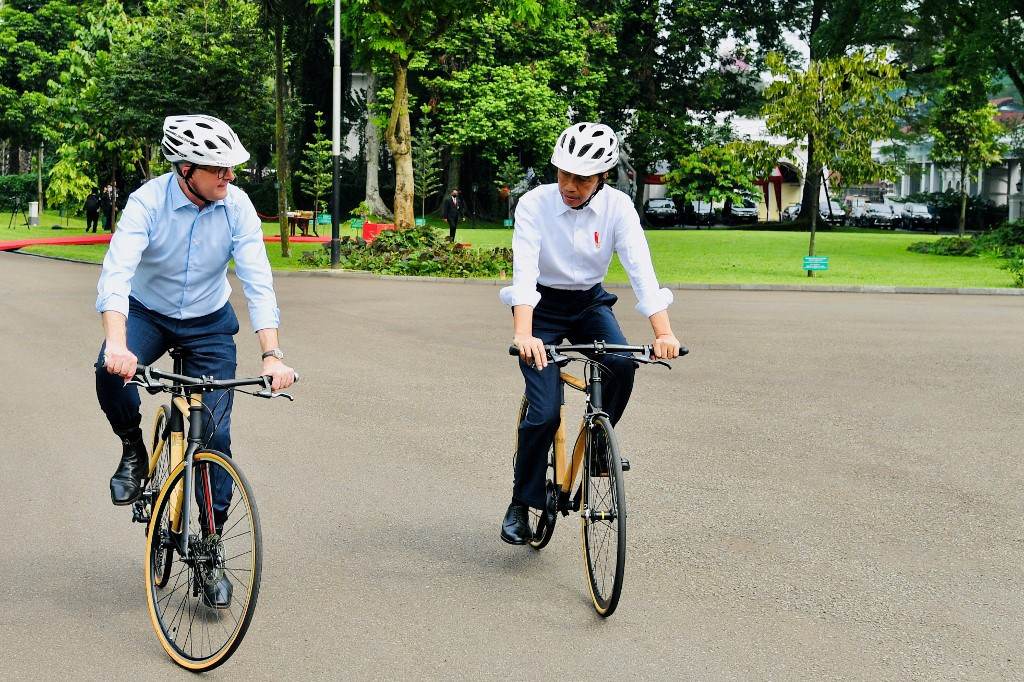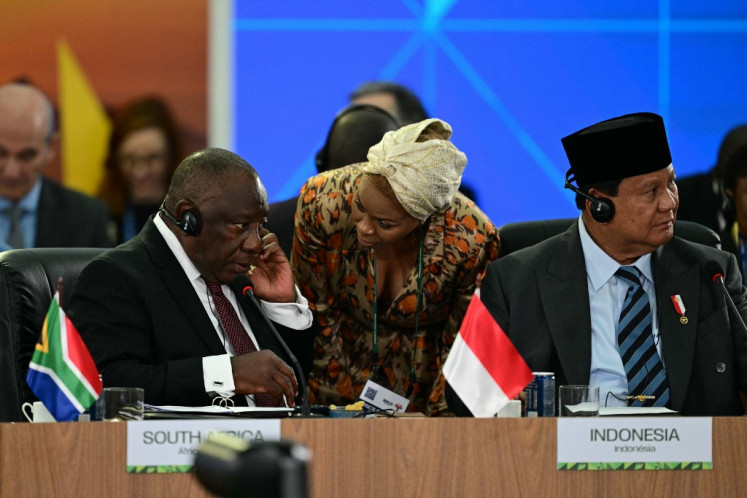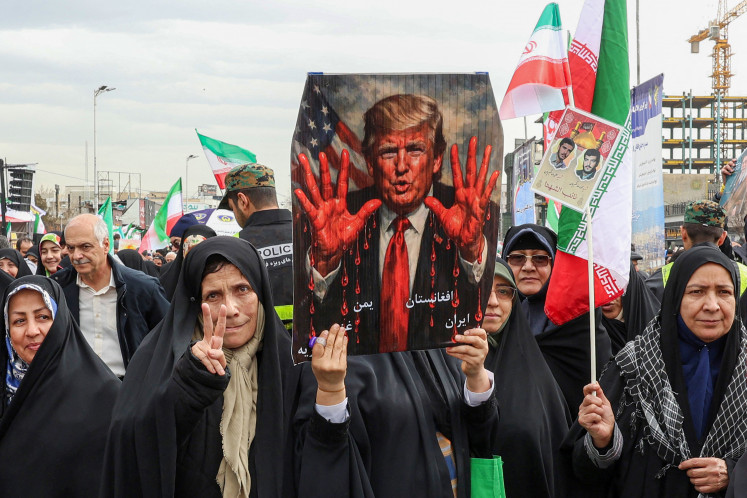Popular Reads
Top Results
Can't find what you're looking for?
View all search resultsPopular Reads
Top Results
Can't find what you're looking for?
View all search resultsIndonesia-Australian ties: How high can they go?
The economic sector remains the weakest link in the overall bilateral relations between Indonesia and Australia.
Change text size
Gift Premium Articles
to Anyone
A
nthony Albanese has hit it off with Indonesian President Joko “Jokowi” Widodo in their first encounter since his election as Australian prime minister last month. On Monday the two leaders took their jackets and ties off and cycled around the lush garden of the Presidential Palace in Bogor, West Java, before getting down to business.
Jokowi has a knack for breaking the ice, particularly with Australian leaders. In 2015, he took then-prime minister Malcolm Turnbull on a blusukan (impromptu informal visits to meet and greet ordinary people) at the Tanah Abang market in Jakarta.
Jokowi knows not only how important relations with Australia are, but also how important it is for the leaders of the two countries to get along. Ties seesawed recurrently in the past because of strained relations between the leaders, sometimes from their erratic behavior. If Jokowi gets along fine with Albanese, this bodes well for their people too, including their business communities.
Jokowi’s personal gesture more than makes up for Indonesia’s failure to reciprocate Australia’s pronouncement, repeatedly made by successive governments in Canberra since the 1990s, that no country is more important to Australia than Indonesia. Albanese followed this foreign policy mantra by making Indonesia the site of his first official bilateral visit since his election on May 21.
Underpinning this Australian approach to its giant northern neighbor is the recognition of Indonesia as a member of the Group of 20 (G20) largest economies in the world, and the predictions that it will be in the top five by 2050. Australia is the only country in the world whose foreign policy anticipates the rise of Indonesia. Its embassy in Jakarta is also Australia’s largest in the world, in terms of staffing.
It is unclear how far into the future Indonesia designs its foreign policy. It is certainly missing in our political discourses, which are more obsessed and preoccupied with 2024. But while Australia may not be the most important country to Indonesia, it is certainly in Jokowi’s heart going by the warm reception he gave Albanese.
The prime minister came to Indonesia with plenty of goodies that only pleased the host nation.
He pledged unconditionally to attend the G20 summit that Jokowi will host in Bali in November. His predecessor Scott Morrison did not make such a commitment and instead pressured Jokowi to disinvite Russian President Vladimir Putin as punishment for invading Ukraine.
Albanese also pledged A$470 million (US$340 million) in development aid for the ASEAN region and another A$200 million for climate change and infrastructure projects in Indonesia.
Far more important than these generous gestures in the bilateral relations, however, is the need to strengthen trade and investment ties, an issue that both leaders, in separate statements, accepted.
Indonesia is not even in Australia’s top 10 largest trading partners, and Australia does not count among the five largest countries with foreign direct investment in Indonesia.
A comparison is often made with the large flow of Australian trade and investment to New Zealand, a country of only 5 million people, as against 270 million in Indonesia. But even ASEAN members Thailand, Singapore and Malaysia are listed as bigger trading partners than Indonesia.
The economic sector remains the weakest link in the overall bilateral relations.
Without stronger economic engagements, relations are vulnerable to the changing moods of their governments. If the two countries were more engaged in trade and investment, there would be hefty economic and political costs to pay if leaders behaved erratically as they have in the past.
The Indonesia-Australia Comprehensive Economic Partnership Agreement (CEPA) signed in 2019 was designed to address this anomaly in the bilateral relations.
Albanese brought with him a large delegation of Australian top CEOs, who held separate meetings with their Indonesian counterparts.
Part of the problem lies with the private business sector for not knowing about the business opportunities in each other’s countries, but another is with Indonesia’s regulatory framework, which has deterred foreign investors who find neighboring Thailand, Malaysia, Vietnam and the Philippines far more welcoming.
This onus is on both governments as well as their business communities to bring the promised benefits of CEPA into reality and to make the two nations more economically engaged.
One excuse often given for the low trading volume is that Indonesia and Australia are both resource-based economies. But this should no longer be used as Indonesia moves into the manufacturing and services sectors, some of them hopefully with Australian investment.
If Australia’s future is tied to the Asian region, as Australian Foreign Minister Penny Wong wrote in an opinion article in The Jakarta Post, then we should make Indonesia and Australia more engaged actively, particularly in the economic sector.
Jokowi has already made the gesture. He gave the bamboo bicycle, which Albanese rode on Monday, as a gift to take home. The prime minister just had to be sure to declare the bicycle to the infamously strict Australian customs when he went home. Jokowi’s predecessor Susilo Bambang Yudhoyono was embarrassingly called out by Australian customs in 2010 for not declaring the famous kopi luwak (special coffee processed by civets) beans that he gave as a gift to then-prime minister Kevin Rudd.
Good personal relations between our leaders, generous positive gestures and strong commitments and respect for one another are key ingredients to building stronger ties. We look forward to new heights in the relations between Indonesia and Australia under the leadership of Jokowi and Albanese.
***
The writer is a senior editor at The Jakarta Post.











